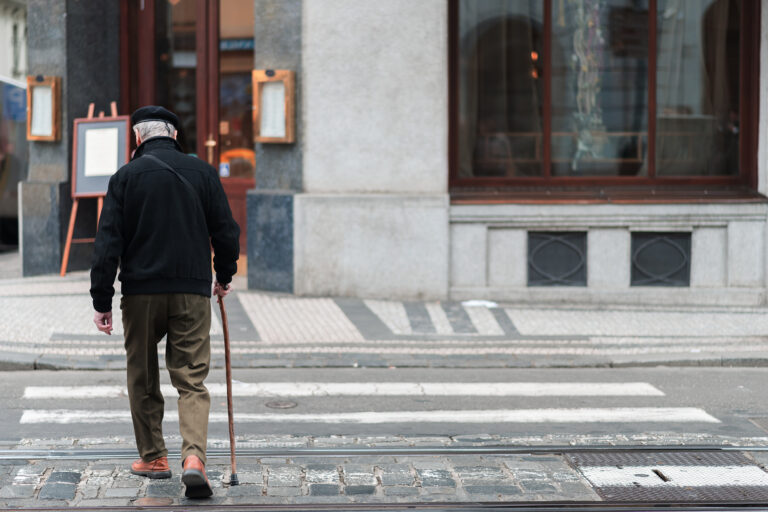
An award-winning journalist, Katie has written for Chicago Health since 2016 and currently serves as Editor-in-Chief.
Studies show that hearing loss increases a person’s risk of falling. Why might that be — and what can you do about it?
No matter where Louis is — working downtown, riding his bike, traveling — his thoughts drift to his 95-year-old mother. More than anything, he worries about her falling.
Louis (whose name has been changed for privacy) has seen his mother go from sitting on a couch, to sliding off. He’s watched her lose her balance as she rises from a chair. And he worries that because she’s been deaf in one ear since childhood and has lost much of the hearing in the other ear, she will fall even more.
“Hearing loss takes away that sense of her surroundings. It clearly contributes to the frequency of falls,” Louis says. He feels like there’s more at stake with each fall, too. “Now that she’s 95, her body has aged. Her mobility is more compromised, she’s weaker, and that also affects her balance.”
A fall can have drastic consequences, changing an older adult’s life in an instant. And some 14 million Americans over age 65 fall annually, says Jeannette Mahoney, PhD, associate professor in the neurology department at the Albert Einstein College of Medicine in New York.
“In fact, over 3 million older Americans require an emergency room visit every year because of fall-related injuries. Falls are the leading cause of injury and injury-related death in older adults, with over $50 billion spent annually on non-fatal and fatal falls,” Mahoney says, citing data from the Centers for Disease Control and Prevention.
Many factors contribute to a person’s fall risk: medications, health conditions, and yes — the senses. Even mild hearing loss, for example, triples a person’s fall risk, according to a study that analyzed people from ages 40 to 69.
Environmental connection
“Hearing connects us to our environment, makes us aware of what’s around us,” says Allison Green, Aud, a senior advisor in Glen Ellyn, Illinois. “We use multiple systems to maintain balance: vision, hearing, the feel of our feet on the ground. Being aware of what’s going on around you is going to help you feel more balanced and steady.”
Ronna Fisher, Aud, founder of Hearing Health Center in Chicago, says the sounds around us help orient us. “If you ever took a yoga class and tried to balance on one leg, your teacher will tell you to stare at one spot — an anchor,” Fisher says. “Stable sounds work the same way, as an auditory anchor. But you have to hear them.”
Yet, Green adds, the ear’s role in balance goes beyond connecting us with our environment’s sounds. The inner ear, located inside of the skull, has two important functions: hearing and balance. “The balance part is just as important as the hearing part because without it, we wouldn’t be able to stand up and walk and move around,” she says.
Still, people tend to take their hearing ability for granted. “It’s not even included in your annual physical,” Fisher says. “Most people haven’t had their hearing tested since grade school.”
Fisher recommends everyone over age 50 get a baseline hearing checkup. And regardless of your age, anyone experiencing hearing loss or balancing issues should talk with their primary care doctor, who will work to find the root cause of the issue. Your physician may also run a fall-risk analysis, though fall screenings have yet to be universally integrated into regular check-ups, Mahoney says.
She hopes to change that. Mahoney spent 15 years developing a fall-risk assessment tool called CatchU. In about 10 minutes, the smartphone app analyzes people’s chances of falling based on their reaction time to visual and touch sensory stimuli. Mahoney’s clients include geriatricians, physical therapists, skilled nursing facilities, and Veterans’ Administration (VA) hospitals. Mahoney says the VA is an especially significant client because “veterans have greater risk of falling and greater risk of hearing impairment, compared to the general population.”
Though the app doesn’t currently include hearing in its fall risk sensory assessment, Mahoney notes the impact of senses in general on fall risk.
“It is well known that increased unisensory deficits are associated with aging,” Mahoney says. “Based on our years of research, we are able to conclude with confidence that older adults who maintain poor multisensory integration are more likely to have a fall compared to older adults with intact sensory integration performance.”
Preserving hearing, preventing falls
Louis hasn’t conducted years of clinical studies, but he has closely studied his mother’s experience. “When you lose your hearing, you lose an incredible sense,” he says. “It’s clear that as her senses began to deteriorate, it contributed to her falling more frequently.”
If you’re concerned about hearing loss and increased fall risk in yourself or a loved one, there is help: hearing aids. “As far as hearing goes, hearing aids are the one option we have,” Green says.
People may avoid hearing aids for a variety of reasons: stigma, cost, or cosmetic concerns. But Green says technological advancements and the increased popularity of “ear jewelry” (wireless headsets and ear buds, for example) help.
“So many people of all different ages are using some type of device. It’s made having something on your ears not as big of a deal,” Green says, adding that hearing aids are sleeker than ever, too. “They don’t just look good — they’re really comfortable to not have a larger hearing aid housed inside your ear.”
Hearing aid cost remains prohibitive for many, though Green is hopeful for continued advancement and accessibility. “We used to say that hearing loss is just part of getting older, that you’ve just got to live with it. Audiology has done a really good job at educating consumers, educating other professionals that we don’t have to live with hearing loss.”
And it doesn’t mean you have to risk falling due to it, either.
This article was written with the support of a journalism fellowship from The Gerontological Society of America, The Journalists Network on Generations, and The John A. Hartford Foundation.






